- Home
- Karin Kallmaker
Car Pool
Car Pool Read online
About the Author
Karin’s first crush on a woman was the local librarian. Just remembering the pencil through the loose, attractive bun makes her warm. Maybe it was the librarian’s influence, but for whatever reason, at the age of 16 Karin fell into the arms of her first and only sweetheart.
There’s a certain symmetry to the fact that ten years later, after seeing the film Desert Hearts, her sweetheart descended on the Berkeley Public Library to find some of “those” books. The books found there were the encouragement Karin needed to forget the so-called “mainstream” and spin her first romance for lesbians. That manuscript became her first novel, In Every Port.
The happily-ever-after couple now lives in the San Francisco Bay area, and became Mom and Moogie to Kelson in 1995 and Eleanor in 1997. They celebrate their twenty-eighth anniversary in 2005.
All of Karin’s work can now be found at Bella Books. Details and background about her novels, and her other pen name, Laura Adams, can be found at www.kallmaker.com.
1
Road Block
“How many?” Anthea leaned back in the chair and schooled her expression to calm resignation.
“I have to drop five FTEs in the department by the end of the month.” Her boss pushed his coffee cup away with a disconsolate expression.
“From which groups?” Anthea braced herself for the worst. To divert her anger, she turned on her mental video screen and the regional vice president
became a paper doll dwarfed by an enormous pair of scissors. Scissors beats paper.
“Planning’s going to have to drop three. You and reporting will make up the other two.”
Just one person to cut… from a group of four responsible for refinery-wide product costing. Anthea gave herself a moment to snip the region veep’s head offnow that’s what I call cutting waste then realized she had to decide who was going to go. There was no decision to be made, at least as far as she was concerned. “You know I’ve been wanting to get rid of Reed for the last two years.”
Martin’s expression hardened. “And nothing’s changed. You’re stuck with him.”
“He’s doing one-tenth the work Ruben is cranking out.”
“Last hired, first fired. You know the policy as well as I do.”
“But that means living with hiring mistakes forever. Not to mention the difference in salaries.” Even to her ears, her usual argument sounded tired. More and more of her brain devoted itself to the spectacle of the gleaming scissors cutting a square out of Martin’s likeness where the heart would be. Realizing her attention was wandering, she dismissed the mental video and mustered her arguments, even though she knew it was a lost battle. Cut one person this quarter, add two next quarter, cut two the quarter after that… it was an endless cycle which made no sense at all.
“I don’t have to cut salaries, only bodies. Look, Reed is going to retire in another couple years ”
“Meanwhile, Ruben goes back on unemployment.
“He’s a damned hard worker. He’s fast and accurate and intuitive. Cripes, Martin, the holidays are right around the corner and Ruben’s got three kids.” Anthea wasn’t about to let him go without using every card she had. “And he’s a person of color. NOC-U is supposed to be hiring and promoting people of color, comprendol”
Martin frowned and looked nervous. Anthea hoped he was thinking about how much money and time an EEO action would cost. He cleared his throat. “Well, there’s two spots available in product accounting ”
“Why not transfer Reed to one of them? I came up through product accounting. Let him retire on the job there.”
Martin’s lips tightened further. “Anthea, I’d love to do that. But Reed isn’t going anywhere. You’re just going to have to get used to that.”
“So we lay off Ruben while Adrian and I get to do the work of four people.” Because Reed wouldn’t take on another single iota of work, Anthea thought. The old fart must have polished a lot of backside to be retired on the job. She and Martin had discussed Reed several times before. When am I going to accept that I won’t win?
“It’ll only be temporary,” Martin said placatingly. “In another quarter the numbers will look better and we’ll be able to hire back.”
“Yeah, but with the recommendation I’m going to give him, Ruben will be working somewhere else by then. And I’ll get to start over training someone which puts me behind even more. Martin, this just isn’t fair to anybody.”
Til try to get him hired on in product accounting,” Martin said halfheartedly. “That’s the breaks, kid. Nobody ever said business was fair.”
Anthea would have said more, but a sense of overwhelming defeat closed her mouth and sent her stomping back to her cubicle. She threw herself into her chair, knocking her knee into the edge of her workstation. She swore softly but expressively and heard a sympathetic cluck from Adrian.
“Knee or elbow?” His voice carried easily over the cubicle barrier that divided their work areas.
“Knee. And I hate this job and this place and everything in it.”
She heard Adrian get up and watched him appear from around the barrier between their two cubes. His nose appeared first, then a mass of unruly red hair, followed by large steel-rimmed glasses and finally his stick-pretzel body. Anthea had long decided he looked like a Yiddish Ichabod Crane. He sidled around the qubicle corner and sat down in her guest chair. “Does that include me?”
“If it weren’t for you, I’d have blown this place a long time ago. Don’t look so skeptical. I would have.”
Adrian gave her a who-do-you-think-you’re-fooling look. “It’s me, remember? Quit? You? After what, ten years now? They know you won’t.”
“I could quit if I wanted to.” Anthea sat up in indignation as Adrian’s expression of disbelief didn’t alter. “Just because I stick with things when the going gets rough doesn’t mean I don’t know when to bail out.”
Adrian looked pointedly at the demure promise
ring Anthea wore the one she’d exchanged with Lois on their first anniversary. “Right. You love change.” His gaze transferred to her light gray blouse and deep teal-green suit. “If it hadn’t been for the fire, you’d still be wearing navy blue, day in and day out.”
Even though she resented his bluntness, Anthea knew Adrian was right. She had worn the office NOCCU uniform for several years until the Oakland firestorm had forced her to buy a new wardrobe. That winter navy blue had been out and other colors had invaded her business wear. “It’s what they have in my size. If I were a seven instead of a twelve I could have my choice of colors.”
Adrian made a mild sound of disgust. “If you were a seven you’d look like hell. One of these days you’ll have to work to look decent, like the rest of us.” He wearily passed his hand over his hair that ringed his head like Art Garfunkel’s at its most global. “Everything looks good on you by pure accident. It’s not as if you try.”
“I do so try,” Anthea said. “I bathe regularly.” She added a superior sniff for emphasis.
“You’re digressing… why do you hate this place more today than you did yesterday?”
Anthea sighed and pushed at the papers on her desk. “The S.O.B.s have won another round.” She noticed Adrian looking at something down the cubicle-created hallway in puzzlement.
“What’s Martin want with Ruben?”
“Ruben’s on his way to Deep Space Nine.” Her voice caught.
Adrian swiveled back toward her, staring at her for a minute, then said, “And the great straight white hope is keeping his job?”
“I’m told that’s the breaks in business. Benefits of seniority.”
“We could work here all our lives and not have the job security he has.” Adrian took off his glasses to rub his eyes. “Damn.
Ruben was just getting really productive. Want to go get drunk?” He put his glasses back on, then tried to smile, but his heart didn’t appear to be in it.
“Not my style,” Anthea said shortly. She wanted to go outside for a cigarette, but she had a transfer pricing mess to work out before the hysterical product managers called her again. From the quantity of voice mail they left for her they evidently thought Anthea was their personal business consultant. She sighed and turned toward her computer.
Adrian exhaled heavily, then went back to his cubicle.
“Did you guys get the usual end-of-quarter surprise?” Anthea shoved her briefcase onto the back seat and wiggled in after it. A needle of icy wind speared between her knees. There were no trees or buildings to cut the impact of the sharp December wind slicing its way from the southern San Francisco Bay and across the refinery parking lot. Lois was already buckled up. Anthea pulled her legs in and
rubbed her arms to warm up. Celia settled herself into the passenger seat.
Lois answered after she had backed the car out. “Three people, but not me or Celia.” She eased her foot on the gas pedal and Anthea took a moment to admire her lover’s slender ankle, attached to a shapely calf.
“Well,” Celia said. “I’m seriously thinking of looking for another job. I’m sick of this company and being treated like a yo-yo.”
Lois did a double-take. “Cee-Cee, you must be kidding.”
Celia patted Lois’s hand on the gear shift. “I’ll still keep up the tae kwon do class,” she said.
Lois seemed about to say something, then didn’t. Instead she stared fixedly ahead.
An awkward silence started to fill the car, so Anthea said, “It won’t be easy to replace you in the car pool, but you should do what’s best for you.” She broke off, surprised by a furious glare from Lois. Did Lois really like Celia that much? She liked Celia, too. It had been really terrific when Celia, married with a little boy turning six, had joined their car pool, replacing an intense older man who did nothing unless Jesus personally told him it was okay. Within a few weeks Celia had figured out the relationship between Lois and Anthea and said she didn’t mind. It would be hard to replace her, and Anthea would hate going back to pretending she and Lois didn’t live together… telling little lies about Lois’s imaginary apartment.
“Lois,” Celia said in a pleading voice. “I’d have
talked to you about it sooner, but I didn’t have a chance.”
“Right. “
“Nothing has to change… .” Celia’s voice trailed off and she turned to stare out the window.
Anthea looked from Celia to Lois, then glanced up into the rear view mirror, trying to catch a glimpse of Lois’s face. What she saw shocked her … Lois’s face was contorted with anger. After a minute ticked by, Lois said to Celia, “So you still want to continue the classes?”
Celia slowly turned back to Lois. Anthea decided later that if she hadn’t been looking right at Celia she wouldn’t have seen it the quick dart of Celia’s tongue as she licked her lips with an expression of… avarice. The same greed echoed hungrily in Lois’s face.
Anthea digested the glance the two shared and shivered. I’m wrong. Don’t jump to conclusions.
Except that Anthea had forgiven Lois one affair already. That was why Adrian didn’t believe Anthea knew when to bail out of a bad situation. But the situation had been salvageable. It had been hard, but they had worked through it. Anthea had told herself things were even better after the trouble … they had talked so much it had seemed they were as close as they had ever been in their three years together. Even though the heat was finally reaching the back seat, she shivered again. The cold was coming from the pit of her stomach.
Closer… until about two months ago. Two months ago, management had threatened to close down Lois’s entire department and transfer the functions to corporate headquarters in San Francisco.
The survival test had been a new product line campaign and Lois, along with others, had worked around the clock for nearly two weeks. Since then, that feeling of closeness hadn’t come back. Lois had been exhausted. And then she had started those classes to help with stress… classes with Celia.
When they dropped Celia off, Celia said, “See you at class tonight?”
“Sure,” Lois answered. Anthea couldn’t tear her gaze away from the smile the two women shared.
“I’m sorry, Miss Sumoto, in spite of your work history and impeccable degree work, we can only offer you an entry-level position.”
“Field geologist,” Shay said weakly, then realized she was in danger of losing the only job offer she’d had in nearly two months of looking. “Well,” she said in a brighter tone, “it’s a start. I’m sure once I’m in the field I’ll be able to demonstrate my practical experience.”
“Yes, well, that will be up to your supervisors. At the end of probation, your salary will be reviewed along with an assessment of how your personal goals and the company goals mesh.”
After wondering for a second how the goals of National Oil and Chemical Company U.S.A. could mesh with her own, Shay asked what her starting salary would be. Then she pretended the meagerness of it didn’t shock her. She concluded the phone call as cheerily as possible, then crumpled into her only chair. She managed some rapid math in her head. She was trading intermittent temporary computer
work which paid better hourly, but wasn’t full time for a full-time job in her field.
The bottom line was that she would still have to work nights at the pizza parlor. She would have health insurance again. That was a plus even if she did have to wait three months for it, and she would be back in her field of work again, but as a low-paid well-digger. And a driving commute to pay for, all the way from Berkeley to the Palo Alto area. She could move closer, but where was she going to find a place she could have to herself for as little rent as she paid here?
Taking this job also meant working inside of the kind of corporation she and her father had so often been forced to oppose. Still, the job was within part of the company’s environmental cleanup effort, and she could hope that people there were more in tune with the overall goal than corporate management representatives she’d worked with in the past. Even as she tried to tell herself everything would work out, she could imagine her father shaking his head at her in disappointment.
She forced herself to get up and go for a walk. If she sat in her tiny shoebox of a studio and looked at her chair, her bed and clock radio the bulk of her personal assets, aside from the books she would start to cry. Again.
If only, if only. If only Dad had gotten life insurance, she thought. If only the health insurance had covered more than sixty percent of the final cost of hospitalization and tests and doctors’ reviews. One doctor alone, who had looked at her father for five minutes once a week, had charged almost five thousand dollars over the four months of intensive
care. The insurance company said he had charged more than the market and of course, the doctor did not agree. Among the documents she had signed after the doctors told her her father was terminal was a promise to pay what insurance didn’t cover. She’d agreed to all “medically necessary” treatment good God, could she have done anything else? How could she have possibly put a price limit on keeping her father alive?
After the funeral, she had sold everything possible to pay down the hospital and funeral bills. Even their laptop, which she deeply regretted now. There hadn’t been much to sell and she was still neck-deep in debt.
Sumoto & Sumoto had traveled light and fast. The Exxon Valdez, Gulf War, military base closures, hurricanes and everyday industrial toxic waste cleanups had kept them busy and, literally, all over the globe. If her father had known how short his time was, and how hard his illness would hit Shay, he would have planned differently, she was certain. He wouldn’t have worked the last two jobs for expenses only, even if it was for money-poor nonprofits. If only he hadn’t smoked three packs a day and if only he had gone to a
doctor before he’d started coughing up pieces of his lungs. If only Shay hadn’t been so self-absorbed in her first assignment as team leader in the predevelopment of a groundwater cleanup site. She might have forced him to a doctor sooner if only, if only, and he might still be alive.
She had hoped being Glen Sumoto’s daughter would at least get her interviews, but it hadn’t worked out that way. How did you put on a resume
that you’d been devil’s advocate and sounding board to one of the most brilliant minds in environmental engineering? Everyone had apparently failed to notice that Shay had been her father’s partner not his secretary. And now she was going to dig wells on an oil refinery.
She kicked a rock out of her path, then stopped to watch the dogs in the Ohlone Dog Park. Three Labrador puppies rolled like gymnasts in a tussling tug of war over a small stick. Leave it to Berkeley to have a park for dogs, she thought. The only compensation for her tiny apartment, which she guessed had once been a garage under the main living quarters, was its situation right across Hearst from the park.
Well, there were two compensations. The second was Mrs. Giordano, who lived upstairs from Shay and had decided Shay needed mothering. Mothering included supper on Sundays if Shay didn’t have plans, which Shay never did. It wasn’t as if she ever had a moment to make other friends. Making friends took a lot of energy and she didn’t have any to spare.
She felt attached to the Bay Area for some reason she couldn’t fathom. She had no friends here, only a few friends worldwide, actually. Maybe she was hanging around because this was where her father had died and leaving meant he’d really gone, she thought. Tears welled up and she concentrated on watching the puppies for a few minutes. When she felt more at peace, she decided to drop in on Mrs. Giordano to tell her the good news. Such as it was.
Feeling better thinking about Mrs. Giordano
always made Shay feel better she walked back toward her apartment. She earned her supper on Sundays by helping Mrs. Giordano clean up after her unofficial Sunday “soup” kitchen. Mrs. Giordano didn’t make soup; she made lasagna and pizza and spaghetti, all authentic Northern Italian cuisine, and better yet, nutritious, hot and plentiful. Anyone from the small senior citizens’ apartment building down the street could drop in, have a meal and a chat and no money ever changed hands.

 Finders Keepers
Finders Keepers My Lady Lipstick
My Lady Lipstick Because I Said So
Because I Said So Blue Collar Lesbian Erotica
Blue Collar Lesbian Erotica Just Like That
Just Like That In Deep Waters_Cruising the Seas
In Deep Waters_Cruising the Seas Sugar
Sugar Love by the Numbers
Love by the Numbers Christabel
Christabel Substitute for Love
Substitute for Love Warming Trend
Warming Trend Making Up for Lost Time
Making Up for Lost Time Watermark
Watermark Car Pool
Car Pool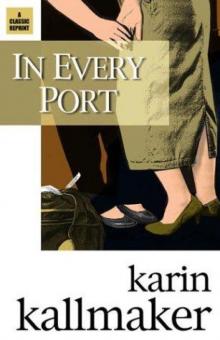 In Every Port
In Every Port Paperback Romance
Paperback Romance Roller Coaster
Roller Coaster Frosting on the Cake
Frosting on the Cake One Degree of Separation
One Degree of Separation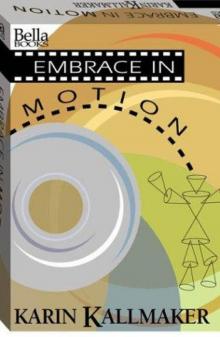 Embrace in Motion
Embrace in Motion Touchwood
Touchwood Above Temptation
Above Temptation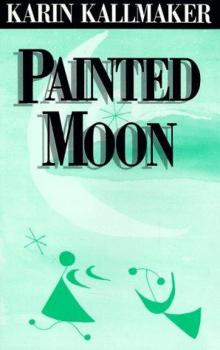 Painted Moon
Painted Moon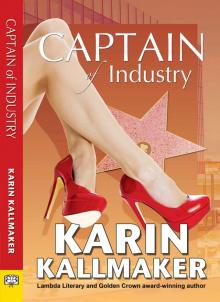 Captain of Industry
Captain of Industry The Kiss That Counted
The Kiss That Counted Wild Things
Wild Things